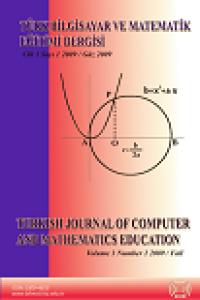Comparing Views of Primary School Mathematics Teachers and Prospective Mathematics Teachers about Instructional Technologies
Öz
Technology is rapidly improving in both hardware and software side. As one of the contemporary needs people should acquire certain knowledge, skills, attitudes and habits to understand this technology, to adapt to it and to make use of its benefits. In addition, as in all domains of life, change and improvement is also unavoidable for educational field. As known, change and improvement in education depends on lots of factors. One of the most important factors is teacher. In order to disseminate educational reforms, teachers themselves should accept the innovation first (Hardy, 1998, Baki, 2002; Oral, 2004). There has been variety of studies investigating teacher and prospective teachers‟ competences, attitudes and opinions (Paprzychi, Vikovic & Pierson, 1994; Hardy, 1998; Kocasaraç, 2003; Lin, Hsiech and Pierson, 2004; Eliküçük, 2006; YeĢilyurt, 2006; Fendi, 2007; Teo, 2008; Arslan, Kutluca & Özpınar, 2009). As the common result of these studies indicate that teachers‟ interest towards using instructional technology have increased. Accordingly, most of the teachers began to think that using instructional technologies becomes inevitable for teachers. By reviewing the related literature, no studies have been come across comparing the opinions of teachers and teacher candidates about instructional technologies. In this study, it was aimed to investigate and compare the views of mathematics teachers with prospective mathematics teachers about ICT. It was considered that collecting opinions of teachers and teachers candidates about the instructional technologies, comparing and contrasting them will contribute to the field. To follow this research inquiry, a descriptive approach type; case study research design was applied. The reason for choosing such design is that the case study method permits studying one aspect of the problem in detail and in a short time (Yin, 2003; Çepni, 2007). The study was conducted with the total sample of 12. 3 of them were mathematics teachers chosen from 3 different schools of different social stratification among primary schools in Artvin city center in the spring term of 2008-2009 educational year, another 3 of them were mathematics teachers from 3 different schools of different social stratification among primary schools in Trabzon city. Prospective mathematics teachers at their last year were randomly chosen from the elementary mathematics teacher training program of Fatih Faculty of Education in Karadeniz Technical University.
The chosen 6 teachers and 6 candidate teachers were interviewed with 9-item semi-structured interviews in duration of 25 to 40 minutes. The opinions of the teachers and candidate teachers were compared and interpreted in a multidimensional point of view by the researchers. Concerning the research inquiries, the obtained data were classified under the titles as; definition of the instructional technology concept, instructional technologies used by the participants, benefits of this usage, competences related to usage of these technologies, suggestions for using these technologies. Based on the data these results were drawn; while the teachers take the instructional technologies concept as technological tool specifically, the candidate teachers, on the other hand, perceive the concept from a broader point of view. The teachers are more acquainted with mainstream technological products like computer and internet however the candidate teachers are also aware of books, magazines and concrete materials. Complying with some previous studies (Baki, 2000; YeĢilyurt, 2006; Lin, Hsiech and Pierson, 2004; Ayvacı et al., 2007), both teachers and candidate teachers agree on that using instructional technologies matters in a positive way. However, since the teachers are actively in-service, they mentioned on application problems, on the contrary the candidate teachers are unaware of the prospective problems. The reason of this situation may be the problems faced during the application but could not be envisaged in the theoretical pre-service education. That the candidate teachers have not encountered these problems may have caused their overlooking of these problems. As another result, it can be concluded that both the teachers and the candidate teachers feel themselves partially competent in terms of using instructional technologies. It was determined that the teachers suggest that there should be an elaborate planning period for using instructional technologies, while the candidate teachers suggested that in-service training should be prioritized for the sake of effective usage of instructional technologies. Backed with the results, it was recommended that candidate teachers should be informed about the benefits of instructional technologies and probable problems they will face and sharing instructional technologies should be supported among teachers.
Anahtar Kelimeler
İlköğretim Matematik Öğretmenleri ve Öğretmen Adaylarının Öğretim Teknolojilerine Bakışlarının Karşılaştırılması
Öz
Bu çalışmada, ilköğretim matematik öğretmenlerinin ve ilköğretim matematik öğretmen adaylarının öğretim teknolojisine bakış açılarını incelemek ve karşılaştırmak amaçlanmıştır. Çalışma, 2008–2009 eğitim-öğretim yılı bahar yarılında, Artvin ve Trabzon'daki 3'er okuldan seçilen birer ilköğretim matematik öğretmeni ve KTÜ Fatih Eğitim Fakültesi İlköğretim Matematik Öğretmenliği Programı son sınıf öğrencilerinden rastgele seçilen 6 öğretmen adayı olmak üzere toplam 12 kişi ile yürütülmüştür. Nitel verilere odaklanan bir özel durum çalışması olarak, seçilen 6 öğretmen ve 6 öğretmen adayı ile ortalama 25–40 dakikalık zaman diliminde, 9 sorudan oluşan yarı yapılandırılmış mülakatlar yapılmıştır. Öğretmenlerin ve öğretmen adaylarının görüşleri araştırmacılar tarafından farklı kategoriler altında yorumlanmış ve karşılaştırılmıştır. Hizmet öncesi ve hizmet içinde öğretim teknolojilerinin nasıl değerlendirildiği; haberdarlık, yeterlik, kullanıma yönelik öneriler gibi çeşitli boyutlarda irdelenmiştir. Öğretmen ve öğretmen adaylarının öğretim teknolojisi konusunda daha fazla bilinçlendirilmesi ve bilgilendirilmesine yönelik önerilerde bulunulmuştur.
Anahtar kelimeler: İlköğretim matematik öğretmenleri, ilköğretim matematik öğretmeni adayları, öğretim teknolojileri
Anahtar Kelimeler
Ayrıntılar
| Birincil Dil | Türkçe |
|---|---|
| Bölüm | Araştırma Makaleleri |
| Yazarlar | |
| Yayımlanma Tarihi | 6 Kasım 2013 |
| Yayımlandığı Sayı | Yıl 2009 Cilt: 1 Sayı: 1 |


